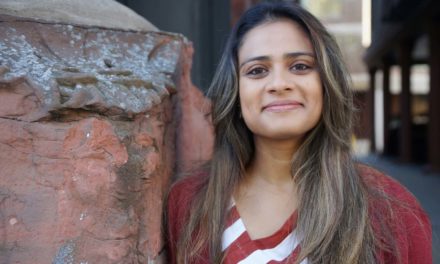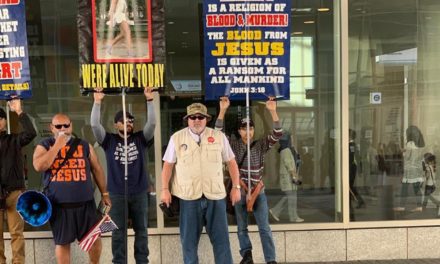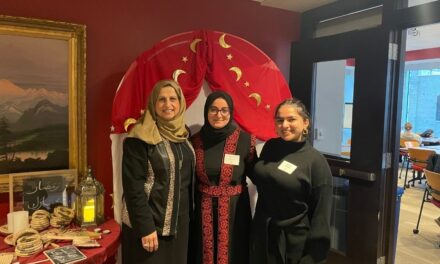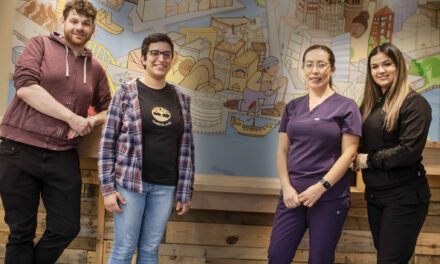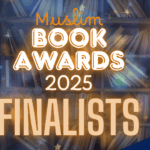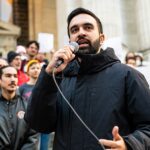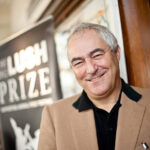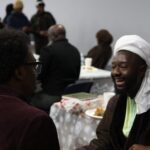Photo ©
WMJ for UW-Madison and Alverno
This article is the second in a two-part series examining how religious observance policies and practices at universities in Wisconsin are impacting Muslim students and changing campus cultures. (See Part I.)
University of Wisconsin – Madison’s Spring 2021 instructors received an email in April that included the following paragraph:
“As we noted prior to Spring semester, Ramadan falls on April 12 – May 12 this year, which includes finals week Spring 2021. Muslim students who observe Ramadan will fast from dawn to sunset; please extend all possible flexibility to these students.”
It was the third reminder to UW-Madison instructors that the university’s 300-400 Muslim students may be abstaining from food and drink for more than 15 hours each day at the most stressful time of the semester, when they are required to deliver research papers and projects, and take final examinations.
For UW-Madison Vice Provost for Teaching and Learning John Zumbrunnen and others responsible for guiding and supporting faculty, the intersection of Ramadan and final exams this year is more than a reason to cut Muslim students some slack. “We are an institution of higher education and here is an opportunity to supplement our accommodations policy with some really rich learning opportunities” for faculty and students alike, he said. “This is where we can continue to learn and develop, and work with our instructional community to help them grow and develop.”
How universities in Wisconsin are addressing the convergence of Ramadan fasting and final exams highlights a cultural shift toward inclusiveness taking place on university campuses across the state. It is based on efforts to instill respect for diverse faith traditions and increased knowledge among educators about how learning really works.
Ramadan sparks discussions
Dr. Zumbrunnen is leading a working group at UW-Madison reflecting on the academic calendar and religious accommodations. “We are considering what we can do to provide more information to faculty who may not have a real sense of what it means to a student to be observing a particularly important religious holiday,” he said.
He tries to imagine himself fasting all day. “I would not want to take an exam at 3 or 4 in the afternoon. I would want to take it at 8 in the morning. These are the kinds of accommodations we are imagining happening here,” he said. “What we would suggest to instructors is simply to listen to your student.
“Sometimes instructors don’t realize the extent to which they have the discretion to grant accommodations,” Dr. Zumbrunnen said. “I have been asked by instructors, ‘Can I really make an accommodation?’ Well, of course you can decide you need to offer an exam at a different time to support this student in their particular situation.”

(From left to right) Students Gigi Salous of UW – Milwaukee, Hadi Najeeb of UW – Madison and Rula Sarsour of MATC
A matter of good pedagogy
Rescheduling exams for students who are fasting is about more than respect, as important as that is, Dr. Zumbrunnen said. “I am trying to give my students an opportunity to show me what they have learned. If that is your approach, that melds pretty easily with the idea of accommodating our students.
“I love that idea of pre-emptively, proactively offering an alternative testing time for everybody and not ask who needs it,” he said, referring to a professor at the University of Washington at Bothell, Dr. Bryan White, who in 2017 decided to offer two exam times during Ramadan and allow students to select which time to take the exam. White’s advocacy led to a law being passed in Washington in 2019 that requires professors to reschedule tests for students observing religious practices or holidays, as long as the students provide written notice to their instructors.
“In most employment and life situations our students will find themselves in, they are going to have flexibility,” Dr. Zumbrunnen said. “In my experience, the way the professional world works is if you advocate for yourself and explain why you need a different arrangement, why this project or this presentation needs to happen at this time or on this date instead of that time or that date, that’s usually going to be fine. Putting our students in unnecessarily difficult situations does not prepare them for the real world. I’m not convinced by that argument.
“We are headed in the direction of flexibility, of being in partnership with our students to find ways that legitimately test what they have learned. That should be our goal.”
Shifts in campus cultures
In addition to policies around exams, subtle signs on college campuses show a growing recognition of Muslim practices. UW-Madison offers breakfast bags for students who are eating before dawn. Carroll University in Waukesha has an interreligious, symbol-free prayer room, equipped with prayer rugs.
Mount Mary University in Milwaukee has also converted a chapel to an interreligious space for meditation and prayer. At Marquette University, Campus Ministry has a table in the Alumni Memorial Union where they offer snacks and water for Muslim students to pick up for iftar, the breaking of the fast.
“Today students will have iftar together,” MU’s Muslim chaplain Sameer Ali said last Thursday. “Campus Ministry is very intentionally accommodating, advocating and also celebrating with the students.”

Members of Alverno College Muslim Student Association.
Likewise, “Carroll seeks to build an inclusive community, welcoming students, faculty and staff from any religious or spiritual tradition,” said CU chaplain, the Rev. Elizabeth McCord. In addition to alerting faculty to important religious observances of students from various religious traditions, “we emphasize inclusive education practices as a whole for our curricular and co-curricular settings. Additionally, the Office of Spiritual Life provides Interreligious Awareness Training for various student leaders, including our orientation mentors and residence assistants.”
Supporting students’ diverse religious practices is a relatively new phenomenon, university educators say. Dr. Jennifer Maney, director of Marquette’s Center for Teaching and Learning, said, “A bigger spotlight has been on these issues over the past 14 months,” largely driven by the pandemic raising awareness of diverse needs. Dr. Zumbrunnen said he has noticed those working in higher education “have become more attentive to these concerns within the last 10 years.”
“The sea change came with Sept. 11, 2001,” said Professor of Theology Donald Rappé, who has been teaching at Mount Mary University in Milwaukee since 1989. Dr. Rappé went to Mount Mary directly from a four-year stint in the Middle East, but found when he arrived that “people here were not really interested in knowing about Islam.” Then 9/11 put a spotlight on it.
At the same time, Muslim acquaintances and friends told Dr. Rappé that “9/11 gave them a kind of mandate to represent themselves to their neighbors so that other people could see their humanity.”
Meanwhile, American campuses have been growing in diversity. In 1989, MMU was “not that diverse,” Dr. Rappé recalled. Today, Muslims make up 2% of the undergraduate student population.
“We have to acknowledge American culture itself has evolved in the direction of increasingly recognizing and honoring diversity,” Dr. Rappé said. “Even though we have a lot of political divisions now, we can at least say diversity is being recognized, talked about and acknowledged more than ever at this point in our history.”
MU Muslim Chaplain Ali points to a video circulating online to illustrate how awareness of Muslim practices has grown among young people. During a girls’ soccer game, a Muslim player’s hijab (a scarf covering her hair) is knocked out of place. Understanding the problem, players from the opposing team form a tight circle around her so she can adjust it without being seen.
“That is the kind of understanding we are seeing,” Ali said. “People are gradually becoming a more aware.”

